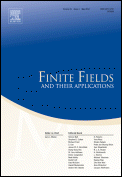
FINITE FIELDS AND THEIR APPLICATIONS
Scope & Guideline
Unraveling the Mysteries of Finite Fields for Tomorrow's Innovations.
Introduction
Aims and Scopes
- Coding Theory:
The journal showcases research on various coding techniques, including linear codes, cyclic codes, BCH codes, and MDS codes, with a focus on their construction, decoding algorithms, and error-correcting capabilities. - Cryptography:
A significant focus is placed on the use of finite fields in cryptographic protocols and constructions, including studies on permutation polynomials, elliptic curve cryptography, and secure coding methods. - Combinatorial Designs:
Research in combinatorial designs, such as difference sets and balanced incomplete block designs, is prominently featured, emphasizing their mathematical properties and applications. - Algebraic Geometry and Number Theory:
The journal covers topics related to algebraic geometry codes, curves over finite fields, and number-theoretic aspects of finite fields, exploring their connections and implications. - Polynomial Functions:
There is a strong interest in the study of polynomial functions over finite fields, including permutation polynomials and their applications in cryptography and coding theory. - Graph Theory:
The journal includes research on graph theory applications related to finite fields, such as Cayley graphs and their properties, contributing to both combinatorial and algebraic insights.
Trending and Emerging
- Advanced Cryptographic Techniques:
There is a growing emphasis on advanced cryptographic techniques utilizing finite fields, including lattice-based cryptography and post-quantum cryptographic schemes, reflecting the need for secure methods in the face of evolving technological challenges. - Applications in Machine Learning and Data Science:
Recent publications indicate an increasing interest in applying finite fields to machine learning algorithms and data science, utilizing their properties for improved data encoding and error correction. - Quantum Coding Theory:
Research related to quantum codes and their construction using finite fields is gaining traction, driven by the need for error-correcting codes in quantum computing applications. - Interdisciplinary Approaches:
The integration of finite fields with other mathematical disciplines, such as topology and algebraic geometry, is emerging as a trend, leading to novel insights and methodologies. - Algorithmic and Computational Methods:
A noticeable increase in algorithmic studies related to finite fields, including efficient computation techniques for polynomials and codes, highlights a trend towards practical applications and computational efficiency.
Declining or Waning
- Elementary Number Theory:
Research related to basic number-theoretic properties of finite fields, such as prime factorization and divisibility, has become less prominent, possibly due to the increasing complexity and abstraction in current studies. - Classical Algebraic Structures:
Topics focusing on classical algebraic structures like simple groups and their properties in the context of finite fields have seen a reduction in publication frequency, as researchers gravitate towards more applied and computational aspects. - Elementary Combinatorial Designs:
While combinatorial designs remain a focus, elementary constructions and classical results have declined in favor of more complex and generalized frameworks that incorporate modern algebraic techniques.
Similar Journals

Armenian Journal of Mathematics
Pioneering Research for a Mathematical TomorrowArmenian Journal of Mathematics is a premier open-access publication dedicated to the dissemination of research in the field of mathematics. Published by the National Academy of Sciences of the Republic of Armenia, this journal has been a significant platform since its inception, freely accessible to readers since 2008. It aims to foster scholarly communication by providing a forum for innovative research, particularly in general mathematics and its miscellaneous applications. As of 2023, the journal is ranked in the fourth quartile of mathematics journals according to Scopus metrics, reflecting its growing presence in the academic community. Although the H-index and specific scope details are currently unavailable, the journal's commitment to promoting high-quality mathematic discourse supports the development of the mathematical sciences within Armenia and beyond. We invite researchers, professionals, and students to explore the Armenian Journal of Mathematics for valuable insights and contributions that advance the understanding of mathematical theories and applications.

Analele Stiintifice ale Universitatii Ovidius Constanta-Seria Matematica
Empowering Researchers through Accessible Mathematical KnowledgeAnalele Stiintifice ale Universitatii Ovidius Constanta-Seria Matematica is a prominent open-access journal established by OVIDIUS UNIV PRESS in Romania, dedicated to advancing the fields of mathematics, specifically in Analysis and Applied Mathematics. Since its inception, the journal has emphasized the dissemination of high-quality research, making it accessible to a global audience. With an ISSN of 1224-1784 and E-ISSN 1844-0835, it has positioned itself within the academic community, achieving a respectable Q3 ranking in both analysis and applied mathematics in 2023, reflecting its commitment to rigorous scholarship. The journal spans a considerable publication window from 2009 to 2024, catering to the ongoing developments in mathematical sciences and their applications. Researchers, professionals, and students alike will find valuable insights and contributions that enrich their understanding and foster collaboration within the mathematical community. The journal's headquarters is based at the Faculty of Mathematics & Computer Science, Bulevardul Mamaia 124, Constanta, Romania.

DISCRETE MATHEMATICS
Empowering the academic community with cutting-edge insights.DISCRETE MATHEMATICS, published by Elsevier, is a leading journal dedicated to the field of discrete mathematics and combinatorics, with a distinguished presence in the academic community since its inception in 1971. With an ISSN of 0012-365X and an E-ISSN of 1872-681X, this esteemed journal has firmly established itself within the Q1 category for Discrete Mathematics and Combinatorics, and Q2 for Theoretical Computer Science as per the 2023 metrics, underscoring its pivotal role in advancing research in these vital areas. DISCRETE MATHEMATICS is highly regarded, reflected in its Scopus rankings, where it stands at #44 out of 92 in its primary category, contributing significantly to the global discourse on complex mathematical theories and applications. Published from the Netherlands, the journal serves as a crucial resource for researchers, professionals, and students looking to stay informed about the latest innovations and methodologies in discrete mathematics. Though currently not an open-access journal, DISCRETE MATHEMATICS continues to foster a vibrant scholarly community through rigorous peer-reviewed research, promoting a deeper understanding of the mathematical structures that underpin both theoretical and applied science.

PUBLICATIONES MATHEMATICAE DEBRECEN
Unveiling New Perspectives in MathematicsPublicationes Mathematicae Debrecen is a renowned international journal published by the University of Debrecen, Institute of Mathematics, situated in Hungary. This journal, with both ISSN 0033-3883 and E-ISSN 2064-2849, has established itself in the field of mathematics since its inception, with coverage extending from 1997 to 2024. Recognized for its rigorous academic standards, it currently holds a Q3 ranking in the mathematics (miscellaneous) category for 2023 and ranks at the 42nd percentile among general mathematics journals in Scopus. Publicationes Mathematicae Debrecen aims to disseminate high-quality research across various areas of mathematics, contributing to the advancement of knowledge and practice in this dynamic field. Although it is not an open-access journal, its readers can access a wealth of scholarly work that addresses both theoretical and applied mathematical issues, making it an invaluable resource for researchers, professionals, and students alike.

Problems of Information Transmission
Navigating the Landscape of Information ExchangeProblems of Information Transmission, an esteemed journal published by PLEIADES PUBLISHING INC, serves as a critical platform for scholarly discourse in the fields of computer networks, communications, computer science applications, and information systems. Established in 1972 and resuming publication from 2005 to 2024, this journal provides a rigorous peer-reviewed environment for researchers to present their findings, methodologies, and innovative applications. With a noteworthy impact factor and categorized as Q3 in several relevant fields in 2023, it ranks within the 30th percentile amongst its peers, indicating its established presence in the academic community. Although the journal is not open access, it remains an essential resource for professionals and students seeking to explore contemporary challenges and advancements in information transmission. For those pursuing knowledge in these dynamic areas, Problems of Information Transmission represents a significant and authoritative source of cutting-edge research and insights.
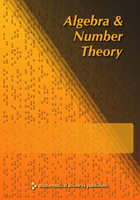
Algebra & Number Theory
Pioneering Research in Algebra and Number TheoryAlgebra & Number Theory, published by Mathematical Science Publications, stands at the forefront of mathematical research, particularly in the fields of algebra and number theory. With an ISSN of 1937-0652 and E-ISSN 1944-7833, this esteemed journal provides a dedicated platform for the dissemination of cutting-edge theoretical advances and practical applications. It has achieved a Q1 category ranking in both algebra and number theory according to the 2023 quartiles, reinforcing its critical role in shaping contemporary mathematical discourse. The journal serves as an essential resource for researchers, professionals, and students alike, offering insights into diverse mathematical methodologies and fostering open dialogue among scholars. Although it does not provide open access, its robust impact factor reflects the high quality and relevance of its published work. Based in the United States at the University of California, Berkeley, the journal's commitment to excellence continues to attract contributions that push the boundaries of mathematical understanding.
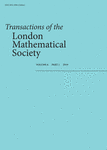
Transactions of the London Mathematical Society
Fostering Collaboration Through Cutting-Edge ResearchTransactions of the London Mathematical Society is a prestigious journal published by WILEY, dedicated to advancing the field of mathematics across various sub-disciplines. With its commitment to Open Access since 2014, the journal ensures that research findings are widely disseminated and accessible to a global audience, enhancing collaboration and innovation in the mathematical community. Based in the United States, this journal enjoys a prominent position within the academic landscape, evidenced by its Q1 ranking in the 2023 Mathematics (miscellaneous) category and its ranking of 181 out of 399 in the General Mathematics category on Scopus, placing it at the 54th percentile. The journal publishes high-quality, peer-reviewed research articles and surveys that aim to foster advanced study and discussion in mathematical sciences, making it an invaluable resource for researchers, professionals, and students alike. With a focus on original research and significant contributions, the Transactions of the London Mathematical Society continues to play a crucial role in the evolution of mathematical inquiry.
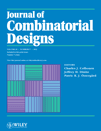
JOURNAL OF COMBINATORIAL DESIGNS
Connecting Researchers through Combinatorial InnovationJOURNAL OF COMBINATORIAL DESIGNS, published by Wiley, is a leading peer-reviewed journal that serves as a vital platform for researchers in the field of discrete mathematics and combinatorics. With an impressive Q1 ranking in the 2023 category, it stands at the forefront of academic discourse, showcasing significant developments and innovative research from 1993 to 2024. The journal is dedicated to the study of combinatorial designs, including their applications in various scientific disciplines, which enhances its relevance among mathematicians and applied scientists alike. Although it operates on a traditional subscription model, the journal continues to attract high-quality submissions, as evidenced by its Scopus rank of #40 out of 92 in Discrete Mathematics and Combinatorics, placing it in the 57th percentile. Its commitment to advancing knowledge in combinatorial theory and applications makes it an essential resource for professionals, researchers, and students seeking to deepen their understanding and contribute to this dynamic field.

Notes on Number Theory and Discrete Mathematics
Connecting Ideas to Shape the Future of MathematicsNotes on Number Theory and Discrete Mathematics is a distinguished journal published by the BULGARIAN ACADEMY OF SCIENCE, dedicated to advancing research in the fields of number theory and discrete mathematics. Renowned for its scholarly contributions, this journal serves as a platform for researchers, professionals, and students to disseminate their findings and engage in critical discourse. The journal’s ISSN is 1310-5132 and its E-ISSN is 2367-8275, enhancing its visibility and accessibility in the academic community. While it currently operates under traditional access constraints, the journal is committed to fostering an open exchange of ideas and methodologies that drive innovation in mathematical research. By focusing on theoretical developments and applications, Notes on Number Theory and Discrete Mathematics plays a pivotal role in the ongoing exploration of mathematical principles, appealing to a broad audience and helping to shape the future of the discipline.
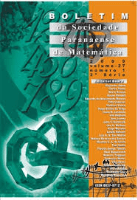
Boletim Sociedade Paranaense de Matematica
Championing Open Access in Mathematical ResearchBoletim Sociedade Paranaense de Matematica is a distinguished journal within the field of Mathematics, published by the Sociedade Paranaense de Matemática in Brazil. With an ISSN of 0037-8712 and an E-ISSN of 2175-1188, this journal has been committed to fostering open access to mathematical research since 2002, ensuring that cutting-edge research is readily available to the academic community. Operating within the diverse landscape of mathematical studies and ranked Q3 for 2023 in the category of Mathematics (Miscellaneous), the journal serves as a platform for innovative contributions and discussions. It ranks 192nd out of 399 in the Scopus database for General Mathematics, reflecting its steady involvement in the global academic dialogue. The Boletim resides at JD AMERICAS, CAIXA POSTAL 19081, CURITIBA PR 81531-990, Brazil, and aims to connect researchers, practitioners, and students by promoting high-quality research and dissemination of mathematical knowledge. By bridging diverse mathematical theories and applications, the journal not only enhances understanding of the discipline but also drives future research directions.